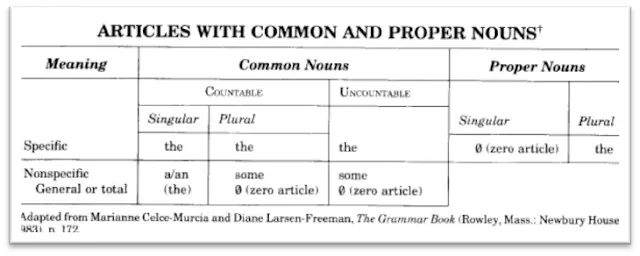Articles
Introduction
Ever wondered how a tiny word like "a," "an," or "the" can make a huge difference in your sentences? Welcome to the world of articles! These small but mighty words are crucial in providing clarity and precision to your writing. Whether you're a student striving to perfect your grammar or a teacher looking to make grammar lessons more engaging, understanding articles is essential. In this post, "Articles," we'll delve into the nitty-gritty of definite and indefinite articles, uncovering their rules and nuances. Let's embark on this journey to master the art of using articles and elevate your writing to the next level!
a-Determiners and articles
Articles (a, an, the) are one type of noun markers called determiners. The class of determiners includes these types of words:
- Indefinite articles: a, an
- Definite article: the
- Demonstratives: this, that, these, those
- Possessives: adjectives (my, his, their, etc.); nouns (Sally's, my mother's, the children's, etc.)
- Quantity words: some, many, much, a lot of, each, every, etc.
- Numerals: one, two, five, seventeen, etc.
The difficulty for language learners, especially those whose languages do not make a distinction between definite and indefinite articles, is to determine when to use an article and which article to use.
Since proper nouns refer to named people and objects, they are usually specific. However, nationality words follow the pattern for common nouns; for example, I met a Greek; Americans like barbeques.
b-Specific reference: the
When you are trying to decide whether to use a or an, the, or no article at all, one of the crucial distinctions to make is whether the noun phrase refers to something actual and specific for both you and your reader either inside the text in front of you or outside it. The examples that follow will cover the most difficult situations. Many other variations are possible, and you will come across them in your reading. When you write, however, you need to be able to choose the form that is most likely to be appropriate.
1. Specific reference given within the text.
Use the definite article the when a noun phrase (a noun with its markers) makes a specific reference for your reader. The reader will know from information contained in the text what actual person, thing, or concept you are referring to.
- The information can be contained at an earlier part of the text:
Standing against the wall was a big black bicycle. . . . She meant to surprise me with the bicycle on Christmas morning.
First we read about a big black bicycle, so we now know that the (actual) bicycle she meant to surprise him with was the one that she had bought and he had discovered.
- The information can be given within the same sentence, in a phrase or clause that makes a specific identification:
The boy who wants the bike is called Russell.
Which boy is called Russell? The reader knows specifically that it is the one who wants the bike.
2. Specific reference to given in the text: familiarity.
We can also use the to refer to something outside the written text when we know the reader's own familiarity with the context will make the reference specific:
Doris was in the kitchen.
As readers, we assume this means the kitchen of the house being described, the house that is the narrator's setting, that is, one specific kitchen.
The same is true with the sentence
She kept the door locked.
From the context, we know that this means specifically Russell Baker's mother's bedroom door.
3. Specific reference with a superlative.
When we use a superlative (the best, the most successful, etc.), we always use the. The use of the superlative distinguishes the noun phrase and makes it actual and specific:
He is the best boss I've ever had.
Sit in the most comfortable chair.
<->
c. Nonspecific reference and generalizations
When we refer to someone or something that will not be actual and specific for the reader or listener, we do not use the. Instead, we use one of the following, according to meaning and type of noun phrase:
- a or an
A countable singular noun must have a determiner. So if you are not using the to refer to an actual, specific living thing, object, or concept, a or an must be used.
She bought a bicycle.
You might know exactly which one, but your reader does not, since you have provided no further information.
Similarly, in this sentence
A bicycle should have lights or reflectors.
the writer is not referring to one actual bicycle but to any one bicycle that represents all others.
- Zero article ∅
For a nonspecific reference that makes a generalization about a total class of living things, objects, or concepts, use no article (the zero article form) with countable plural and uncountable nouns:
Bicycles provide inexpensive transportation. (all bicycles everywhere)
Furniture is expensive. (all furniture, generally)
Note the difference between the following:
He achieved success. (total)
He achieved some success. (partial)
In technical writing, we can also generalize by referring to a plant or object as a specific representative of its class:
The bicycle is a popular method of transportation in China.
As a general rule, though, if you want to make a generalization about a countable noun, use the plural form of the noun with the zero article form:
Bicycles are popular in China.
The zero article form is also used with countable plural noun phrases that occur as a complement:
His parents are wage earners.
- some
To make a nonspecific reference to a countable plural noun or to an uncountable noun when you are not making a generalization, use some:
She bought some lamps.
She bought some furniture
d. Articles with proper and common nouns: summary
The following box gives examples of article use with common nouns.
Because the use of articles is so complicated, it will be necessary for you to build up your own store of examples. When you read, note now articles are used- or not used. Keep a notebook, write sentences down, underline the articles, and try to classify and explain their use according to the summary chart, or note them as exceptions to a general principle.
Articles Practice
$$
Articles Quiz: Multiple Choice
Select the appropriate article (a, an, the) or "none" if no article is needed
Progress: 0/20 Questions
Score: 0/20
English Articles Quiz - Test Your Knowledge
Articles Quiz
$$
Coclusion
Mastering the use of articles can significantly enhance your grammar and make your writing more precise and engaging. By understanding when and how to use "a," "an," and "the," you can add clarity and nuance to your sentences. Keep practicing with the examples and tips provided, and revisit this guide whenever you need a refresher. Remember, the key to mastering language lies in curiosity and consistent practice. Happy learning, and may your use of articles always be spot-on!
Resources
- Raimes, Ann, and Maria Jerskey. How English Works: A Grammar Handbook with Readings. 3rd ed., Cambridge University Press, 2010.



